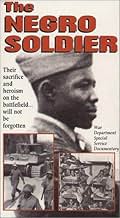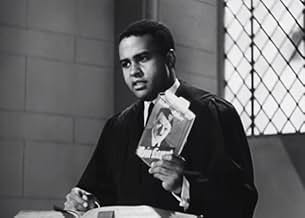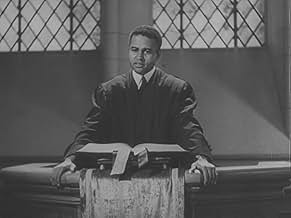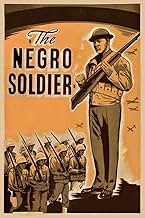Ajouter une intrigue dans votre langueDocumentary focusing on the contributions to the American war effort of African-American soldiers.Documentary focusing on the contributions to the American war effort of African-American soldiers.Documentary focusing on the contributions to the American war effort of African-American soldiers.
- Prix
- 1 victoire au total
Clyde Turner
- Soloist in Church
- (as Sgt. Clyde Turner)
Bertha Woolford
- Mrs. Bronson
- (as Bertha Wolford)
Norman Ford
- Lt. Robert E. Bronson
- (as Lt. Norman Ford)
Gertrude Elise Ayer
- Self - Principal
- (archive footage)
Richmond Barthé
- Self - Sculptor
- (archive footage)
- (as Richard Barthe)
Erich Borchmeyer
- Self
- (archive footage)
Dean Dixon
- Self - Conductor
- (archive footage)
W.C. Handy
- Self
- (archive footage)
Matthew Henson
- Self - Polar Explorer
- (archive footage)
Adolf Hitler
- Self
- (archive footage)
Cornelius Johnson
- Self
- (archive footage)
Henry Johnson
- Self - WW1 Soldier
- (archive footage)
Ralph Metcalfe
- Self
- (archive footage)
Lawrence Reddick
- Self - Museum Curator
- (archive footage)
Histoire
Le saviez-vous
- AnecdotesIn 2011, the film was selected for preservation in the National Film Registry by the Library of Congress with the following statement: "'The Negro Soldier' showcased the contributions of blacks to American society and their heroism in the nation's wars, portraying them in a dignified, realistic, and far less stereotypical manner than they had been depicted in previous Hollywood films."
- Autres versionsAccording to government documents, a two-reel shortened version of the film was released in July 1944.
- ConnexionsEdited from America (1924)
Commentaire en vedette
I am continuing my US military propaganda film viewing series. I was surprised that this was available on Netflix, but grateful because some of the other films are much harder to come by. Of course, the word "negro" is no longer acceptable, but I'm not going to blame the film as racist for using it, since it was a vastly different time. If there is racism in the film, I will address it separately, but only for historical and cultural analysis, and not to blame the filmmakers or offer a prohibition on its content.
The film starts out with exterior shots of people of color entering a church and a minister leading a sermon. Everyone looks proper and staged, almost whitewashed. The minister recalls the names of a few soldiers in the pews, except he forgets the only female soldier's name and she reminds him. It seems like an odd detail to add to the film. Why forget the only girl's name? This may be an example of sexist microaggression in America, but it also may be nothing at all. Many things are trivial, but just like using the word "negro", it may have been nothing at the time or even normal, but looking at it with a modern lens, it is clear there may be some underlying opinions or motives. Whether they are conscious or not, these racist terms and sexist attitudes were normalized and led to much greater examples of racism and sexism. Of course, like I prefaced, I am not calling this a racist or sexist film thus far nor am I saying it is prejudice material, but I am trying to recount that there are behaviors that either justify or develop into worse things. By looking back at a film like this, these things are more noticeable and it inspires me to take a closer look at the things we're saying now and how they may be interpreted in the future.
Aside from the representation of women and people of color, the true racism in the film lies in the hatred towards Germany and a little bit of Japan, too. Of course, they are the enemies in this war, but the film is essentially flexing America's muscles over Germany and Japan's. In addition to war footage, they show black people beating Germans and Japanese at several sporting events. Then, they emphasize the evil that those countries have done during war. Of course, while this is true, we don't see any of the horrible things America did during the war or any of our losses in sports. The key to propaganda is showing why we're good and they're bad. We're supposed to be focused only on how we're flawless and the enemy is evil and weak. Obviously, they're not going to show America's weakness and faults, but I think it's good to keep in mind that America isn't perfect, so we don't watch this film agreeing that the only problem is the enemy.
Aside from social analysis, the production value of this film is very good. I don't know how much stock footage was used vs shot footage, but there was clearly a lot of work put into the film. The plot involves a sermon glorifying the need for people of color to serve in WWII and includes a lot of examples and parallels to other wars and sports. While the minister speaks, footage of his examples are shown. These images are interesting to see as well as the amount of nice closeups of people in the church. Overall, it is just American military propaganda, but among the other films, this one is the most interesting to watch so far.
- KyleLicht
- 30 juill. 2019
- Lien permanent
Meilleurs choix
Connectez-vous pour évaluer et surveiller les recommandations personnalisées
Détails
Box-office
- Budget
- 78 254 $ US (estimation)
- Durée43 minutes
- Couleur
- Mixage
- Rapport de forme
- 1.37 : 1
Contribuer à cette page
Suggérer une modification ou ajouter du contenu manquant

Lacune principale
By what name was The Negro Soldier (1944) officially released in Canada in English?
Répondre












